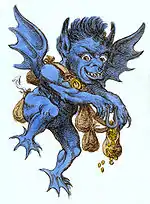velns
Latvian
FWOTD – 4 November 2013

Velns, sātans (1)

Velns (3)
Etymology
From the same stem as velis (“dead (one)”) q.v.), with an extra n, perhaps under the influence of melns (“black”) (cf. expressions like melns kā velns “black like the devil,” i.e., very bad), or maybe from a derivational suffix (cf. Lithuanian vẽlinas > *velʲnas > vélnias). Cognates include Lithuanian vélnias, dialectal véls.[1]
Pronunciation
- IPA(key): [vǣlns]
Noun
velns m (1st declension)
- (theology, Christianity, often capitalized; syn. sātans) the Devil; Satan (the lord of hell, the king of evil spirits, the father of sin)
- pārdot (savu) dvēseli velnam ― to sell one's soul to the devil
- ja tevi velns vilina uz ļaunumiem, sevišķi uz miesas kārumiem, tad nedomā velna ne caur ko drīzāk aizgainīt, kā pastāvīgi strādājot ― if the devil tempts you to evil, especially to carnal desires, then don't think of (= there isn't) any better way to make the devil go away than to keep working
- (mythology) devil (in Latvian mythology, the ruler of the underworld where the souls of the dead go after death)
- velns ir dievība latviešu un lietuviešu mitoloģijā, kas pārvalda tumšo un ļauno ― the devil (velns) is a deity in Latvian and Lithuanian mythology that governs the dark and the evil
- (mythology) devil, demon, evil spirit (supernatural creature that does evil deeds)
- purva velns ― swamp devil
- velna nedarbs ― devil's mischief
- dzirnavās naktī bija dzīres: velni dejoja ar raganām ― at night, at the mill, there was a feast: devils danced with witches
- “lieta pavisam vienkārša: purvā dzīvojot velns...” “un ko šis te darot?” “sargot bagātības, lai citi velni tās nenozog...” — “the matter (is) very simple: in the swamp there lives a devil” “and what does he do there?” “he protects (his) riches, so that other devils don't steal them”
- (figuratively) vice, bad habit, bad feelings
- lepnības velns bija apsēdis ļaužu prātus ― the devil (= vice) of pride had sat down in the people's minds
- skaudības velns sagrāba bagātās saimnieces sirdi un plosīja asiem nagiem ― the devil (= vice) of envy caught the rich lady's heart and tore it with sharp nails
- (figuratively, colloquial) bad, evil person; energetic, turbulent person
- velns viņa ir, ne sievišķis ― she is the devil, not a woman
- “...kopā 375 lati: ko teiksi? kas māk, tam nāk...” “tu esi velns!” ― “...altogether 375 lati: what do you say? who knows, to him it goes...” “you are a devil!”
- (in the genitive) devil's, devilish (bad, harmful, undesirable, inappropriate)
- ak tu velna vecis tāds! ― you devil of an old man!
- tfi, velna laiks! divas stundas paies, kamēr aizkulsimies ― tfi (= phew), no fun (lit. devil's time)! (still) two hours will go, before we get (there)
- (figuratively, in the genitive) devil's, devilish (very effective, very impressive)
- “velna skuķis!” viņš nogrozīja galvu; “kā viņa dzied un kā skatās!” ― “devilish girl!” he shook his head; “how (well) she sings and looks!”
Usage notes
Velns is the most frequent, more colloquial term, often used in less serious, less "evil" contexts than its more "theologically evil" synonyms dēmons or sātans (cf. English devil in expressions like or you little devil! or poor devil).
Declension
Declension of velns (1st declension)
Antonyms
Derived terms
Related terms
References
- Karulis, Konstantīns (1992), “velns”, in Latviešu Etimoloģijas Vārdnīca (in Latvian), Rīga: AVOTS, →ISBN
This article is issued from Wiktionary. The text is licensed under Creative Commons - Attribution - Sharealike. Additional terms may apply for the media files.